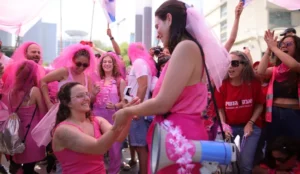Protest in Pink: An Israeli Wedding Insurrection Against the Powerful Chief Rabbinate
May 8, 2023
The Rabbinate is widely seen as a key obstacle to the advancement of Israeli women’s rights ■ As a Haredi, I proudly joined the pro-democracy camp. Now I'm their target


A pink wedding in Tel Aviv. Moti Milrod
Judy Maltz reports in Haaretz Today
Hundreds of demonstrators gathered outside Tel Aviv’s rabbinical court on Thursday morning to protest a government initiative that many believe would enhance the power of Israel’s religious courts to the detriment of women.
Many of them held signs stating: “There’s no democracy in a halakhic state.”
The protest culminated with a march to the nearby Tel Aviv District Court, where a group civil wedding was held for both straight and gay couples. They were all dressed in pink and stood under a pink chuppah – in defiance of Israeli law that prohibits civil marriage.
The events were part of the day’s nationwide disruptions by the pro-democracy protest movement, now in its fifth month. It was the first time, however, that the offices of Israel’s powerful Chief Rabbinate had been targeted – indicating a shift in the protesters’ focus from the original goal of fighting the government’s now-paused judicial overhaul, to fighting the rabbinical establishment and the special privileges enjoyed by the ultra-Orthodox community.
Thursday’s theme was inequality in Israeli society, with special emphasis on the military burden. The Haredim are largely exempt from compulsory army service, and their representatives in government have been pushing for legislation that would ensure this situation never changes. Expressing anger and frustration, demonstrators outside the rabbinical court chanted repeatedly: “Where were you in the army?”
The rabbinical court demonstration was dominated by women, who represented a number of groups active in the pro-democracy movement. These included the “Handmaid’s Tale” protesters and the “granny” protesters. Near the court entrance, protest poems highlighting the discrimination of women in Israel were recited.
The Rabbinate, which controls all issues of marriage and divorce among Jews in Israel, is widely seen as a key obstacle to the advancement of women’s rights locally. As part of the coalition negotiations, the government agreed to pass a law that would expand the powers of the rabbinical courts to adjudicate on a wide range of civil matters – and not only family disputes. This law is set to come up for a vote in the Knesset summer session, which opened this week.
“We see this as the beginning of a slippery slope and are demanding our own reform now – a reform that would take away power from the rabbinical courts,” said Moran Zer Katzenstein, a leader of the women’s protests.
A young mother, carrying her newborn in a baby carrier attached to her body, held a sign that said: “My daughter won’t get married through the Rabbinate.” In a twist on the Hebrew word for “dictatorship,” another protester had written on a piece of cardboard: “DictaTorah.”
Yael Dadia, a legal translator, had accompanied her mother to the protest. She wore a T-shirt with the words “Feminism is my second favorite F-word.”
“We’re here to demand equality, and the halakhic laws of the Rabbinate are the exact opposite,” she said.
The members of the granny group wore blue T-shirts that said on the front “Grandmothers for democracy” and on the back “No babysitter – grandmothers are at the protest.” It wasn’t exactly true, however, as several of the protesters did drag along their young charges in carriages.
